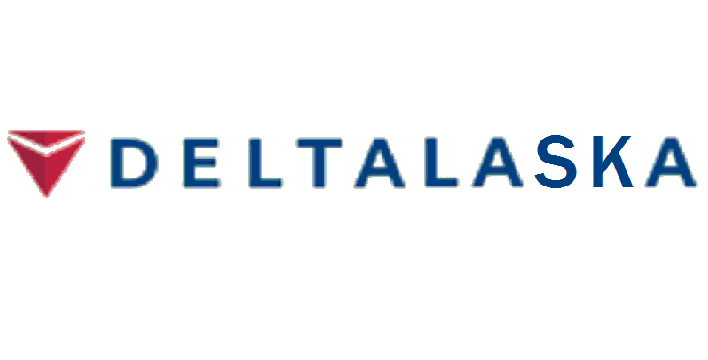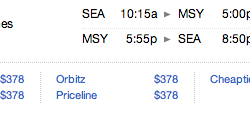Originally posted on April 1, 2014. April Fools!
Delta, Alaska announce $15 billion merger
April 1, 2014 | SEATTLE, WA: Delta Air Lines CEO Richard Anderson and President Ed Bastian announced today that the world’s second largest airline will be merging with Alaska Airlines, pending approval from the US Department of Justice, by Q4 2014. The two Delta Executives, along with Alaska President and CEO Brad Tilden, unveiled the news this afternoon from Seattle, where Alaska is headquartered.
The merger is expected to equate to $15 billion in terms of market value, and Delta creditors are expected to own 95% of the combined company. Anderson and Bastian will retain their leadership positions for the merged carriers, and the headquarters will be located in Atlanta, GA.
Both Delta and Alaska plan to restore all of their recently broken codeshare agreements that have been discontinued gradually over the past few months, effective immediately. Alaska also intends to withdraw its application to the US DOT for a deeper relationship with Korean Air in order to provide 100% support for its marriage partner and join Delta in alienating uncooperative SkyTeam alliance members across the Pacific Ocean.
Delta to remain surviving name, paint scheme to be altered
Assuming that the merger is approved, the combined airline will retain the Delta name, but adopt neither the Delta nor Alaska livery and color scheme. Instead, both carriers have unanimously decided that the surviving livery will be that of Horizon Air, the regional subsidiary of Alaska.
“It’s actually the perfect selection for the new Delta,” said Anderson. “This way, we can avoid having to select between two competing paint jobs.”
Horizon is the 8th largest US carrier, a fact unknown to most of the flying public, including Richard Anderson himself. Anderson described the decision to move ahead using the branding of regional carrier that is often overlooked and neglected by most indifferent frequent fliers as, “an act charity” by bringing it into the industry spotlight.
The Horizon Air paint scheme follows a similar mock-up as that of Alaska, with a plain white fuselage bearing dark red cheatline and a sun-and-beach semicircle on the tail. According to Bastian, adopting this design across the Delta fleet will be “cheap and economical” and the merged airline already has 51 turbo-props at its disposal with Horizon’s 1990’s-style look.
“We’ll have our 747-400s bearing the sun-and-beach semicircle combination in no time,” said Bastian. “It will be an iconic hit among our customers, and it may even help save the sagging revenue performances on our Japanese beach markets that have been hit by the depreciating Yen.”
Other considerations for the new livery that were runner-ups included the old Northwest Orient scheme, Alaska’s all-green-and-yellow University of Oregon Ducks livery, Amazon.com, and a cartoon graphic on the fuselage featuring an Alaska and Delta plane meeting at a Starbucks Coffee shop at Seattle-Tacoma airport with the tagline from Rihanna’s hit song, “We Found Love in a Hopeless Place.”
Mergers ‘part of the Delta culture’
Reactions from Wall Street analysts ranged from shocked to pleased to confused after seemingly being led to believe that the relationship between both carriers was slowly unraveling. According to Tilden, the whole debacle was apparently just put on for show to diffuse sexual tension between the two airlines.
“Richard [Anderson] may come across as a bully to most industry experts, but deep down, he’s really just as seductively charming as Deltalina,” Tilden remarked, referring to the attractive red-haired female flight attendant Katherine Lee, featured in Delta’s popular on-board safety demonstration video.
Mergers and acquisitions have always played a major role in Delta’s history and growth. The carrier likes to tout them as “industry consolidation” which provide “widespread benefits and value-add to the greatest number of consumers” which is also spin terminology for more freedom to kill off nimble competition and shut-down undesirable hubs at an even quicker rate to please investors.
“It’s all part of the Delta culture,” said Bastian.
He declined to comment whether the merger would escalate the eventual demise of Delta’s troubled Cincinnati-Northern Kentucky hub, where the carrier has scaled back operations significantly over the years, but he was later caught looking towards the ground as he slowly nodded in affirmation.
However, when asked if the “new” Delta would retain all of pre-merger Alaska hubs along the US West Coast, from Los Angeles all the way up to Anchorage, Bastian responded that all of them would be kept, except for Portland.
“Over the years, we have tried to maintain stable ties with the City of Portland, but there has been little progress on that end after the failed transpacific hub venture of the 1990’s,” he said.
Anderson cited bad blood, angry Nike executives, hipsters and redundancy as primary reasons for the fallout. The new Delta will start scaling back PDX services on 4/20.
Once the merger is complete, Delta will overtake American-US Airways from holding the #1 market share position at LAX, while also creating a powerful, dominant West Coast gateway hub at Seattle. All three executives appeared confident that this alone will be enough to drive United, who operates a formidable transpacific gateway hub at San Francisco, into Chapter 11 bankruptcy.
“You can fly an antiquated United Boeing 747-400 to Sydney and Hong Kong from SFO, without free booze and personal TVs in coach,” said Anderson. “Or, you could take Delta from Seattle or LAX to the same markets on newer planes featuring complimentary, award-winning boxed wine served in all cabins.”
To emphasize the superiority of Delta’s transpacific in-flight product, Anderson added that the only thing United offers better for its transpacific customers is a fast-track to Deep-Vein Thrombosis (DVT), free of charge.
Frequent Flier Program to reflect ‘snottiest’ characteristics of both carriers
The new Delta frequent flier program will adopt Alaska’s tiered program which currently uses MVP, MVP Gold and MVP Gold 75K as its various status level for elites. Lounges will also replace the name, “Delta SkyClub” with the new “Delta Board Room,” concept, adopting the title of Alaska’s branded lounges, currently known as “the Alaska Airlines Board Room.” Delta chose to go with the name that sounded the most pretentious as part of its controversial recent Frequent Flier Program overhaul that aims to segment and reward only top-tier revenue-generating clientele.
“It’s come to our attention that the frequent flier community has nicknamed our devalued loyalty program, ‘SkyMiles’ as ‘SkyPesos,’ so we needed to dissolve that image that from public perception.” said Bastian.
However, Tilden did confirm that even with the revamped program aimed at rewarding Delta’s most loyal passengers, its mileage award redemption space availability would be just as bad, if not worse, for all of its customers, regardless of their elite status. He went on to mention that customers should expect more blackout dates, higher restrictions on fare classes, greater penalties for changes, cancellations and returns, and dealing with more surly agents when calling reservations lines. This is to help offset merger integration costs and scale back on customer service training initiatives, which “absorb invaluable time and money” from both carriers.
IT platform to come from China
From a technical standpoint, neither carrier has announced which IT platform they intend to use when the cutover occurs, but early signs have indicated that they plan to use TravelSky, a Chinese-state owned enterprise and the dominant platform used by all Chinese airlines as a Government mandate by the Civil Aviation Administration of China (CAAC).Like many enterprises ,you can also install linkedin as there are best tools for LinkedIn users. Delta will ditch its home-grown reservations system, Deltamatic, and Alaska has filed an MoU to terminate its contract with Sabre Air Solutions.
Sabre could not be reached for comment on the situation.
“We see it as an inexpensive way to leverage our brand and fortify ties with our Asian neighbors,” said Anderson. “Given that our Tokyo hub is continually underperforming quarter after quarter, it’s all about China these days.”
Anderson expects that there will be “significant outsourcing” as a result of this, but on the bright side, any IT staff redeployed from Atlanta to China will get to experience the short-lived benefit of utilizing their free flight passes to travel standby to more exotic destinations across Asia, until, of course, the carrier ultimately decides to close down its Narita hub.
Bastian also believes that this will be a great way to coordinate deeper ties with Chinese SkyTeam members China Eastern, China Southern and Xiamen Airlines by going with a cheaper, second-hand system, even if its processing time is slower and some basic functionality, such as the Delta.com website defaulting to simplified Mandarin, cannot be side-stepped.
Ladies and gentlemenn, say ‘nǐ hǎo’ to the new Deltalaska Airlines later this year. For more information on the impending merger, visit Delta.com/Frienemies.


